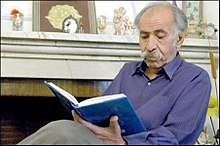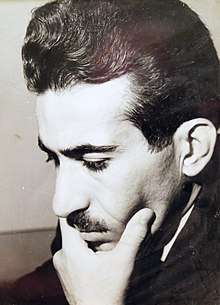Abdolali Dastgheib
Abdolali Dastgheib (Persian:عبدالعلی دست غیب; born November 7, 1931) is an Iranian literary critic, writer, translator and author of 66 books and numerous articles.[1]

Biography
Abdolali Dastgheib was born in Shiraz, Iran. His father (Javad) was a teacher and school principal and was later assigned as the head of the Department of Education in Firuzabad and Jahrom in Fars province.[2]:11–12 Following his school education in 1948, Abdolali enrolled in Teachers College (دانشسرای مقدماتی) in Shiraz and worked as a teacher for three years. He was taking part in street demonstrations against the Shah's regime in 1952 when he was arrested and jailed for one year.[3]

Abdolali worked as a notary public's assistance for two years and in the Health Department for three years. He then enrolled in the Higher Education College (دانشسرای عالی) in Tehran and completed a bachelor's degree in philosophy in 1961.[4] Abdolali Dastgheib then started a career in education, teaching Persian literature and philosophy in high schools and colleges in his hometown of Shiraz as well as in Tehran.[4]
Dastgheib picked up the love of books and reading as a schoolboy.[2]:50–53 He read extensively Iranian and foreign novels and became familiar with the world literature. Exposure to poor conditions in the rural areas opened his eyes to the inequalities suffered by people.[3]
Dastgheib married in 1971 while working in Tehran. He has a son (Mohamad Javad=Pedram) and a daughter (Nakta) both living in Tehran.[3]
Publications
Abdolali Dastgheib started writing articles in literary magazines from a young age. His first article was published in Noor-e-Danesh magazine when he was 12 years old.[3] His work as a literary critic started from the 1960s by publishing articles in literary magazines including Sokhan, Payam Novin and Ferdowsi.[5][6] Dastgheib has written critics on famous Iranian poets and writers such as Nima Yooshij, Shamlou, Akhavan-Sales, Sepehri, Forough Farrokhzad, Sadegh Hedayat and Gholam-Hossein Sa'edi. Dastgheib has also played a role in introducing Western writers and philosophers such as Aristotle and Friedrich Nietzsche to the Iranian society through translations and critical reviews.[7]
Abdolali Dastgheib became fascinated by the great Iranian poet of the 14th century, Hafiz and wrote extensively on his poetry.[7] His major work on Hafiz covers two volumes titled Hafez Shenakht حافظ شناخت or Knowing Hafez and was published in 1998. In this and other publications, Dastgheib tries to cut through the superficial layers of the complicated poems of Hafiz and find the true meaning in his work.
Dastgheib is a respected figure in Persian literature. His extensive and long literary contribution has been recognised. He was selected as the Exemplary Critic by the Ministry of Culture in 1995[4]:360 and was awarded an Appreciation Award and was named one of the Perennial Figures of Iran literature in 2003.[4]:360 More recently in 2016, Iranian Ministry of Culture recognised Dastgheib's long services to literature by giving him an Honorary award.[1][4]:360[8]
Some of Dastgheib's books on modern Iranian poets
- The Messenger of Hope and Liberty, Critical Review of poems by Nima Yooshij. 2006. Amitis Publishers, Tehran, Iran. ISBN 964-8787-12-3. (Persian title: پیام آور امید و آزادی)
- The Poet of Love and Dawn, Critical Review of poems by Ahmad Shamlou. 2006. Amitis Publishers, Tehran, Iran. ISBN 964-8787-10-7. (Persian title: شاعرعشق و سپیده دمان )
- The Green Garden of Poetry, Critical Review of poems by Sohrab Sepehri. 2006. Amitis Publishers, Tehran, Iran. ISBN 964-8787-08-5. (Persian title: باغ سبز شعر )
- The Poet of Defeat, Critical Review of poems by Mehdi Akhavan-Sales. 2006. Amitis Publishers, Tehran, Iran. ISBN 964-8787-11-5. (Persian title شاعر شکست )
- The Little Mermaid, Critical Review of poems by Forough Farrokhzad. 2006. Amitis Publishers, Tehran, Iran. ISBN 964-8787-09-3. (Persian title پری کوچک دریا)
Literary critics[7]
- An Analysis of Modern Persian Poetry, Saaeb Publishers, Tehran, 1966.
- Shades and Lights of Modern Persian Poetry, Farhang Publishers, Tehran, 1969.
- Critical Review of Nima Yooshij, Paazand Publishers, Tehran, 1972.
- Critical Review of Gholam-Hossein Sa'edi, Chaapaar Publishers, 1973.
- Critical Review of Ahmad Shamloo, Chaapaar Publishers, 1973.
- Critical Review of Sadegh Chubak, Paazand Publishers, 1974.
- Critical Review of Sadegh Hedayat, Paazand Publishers, 1974.
- Critical Review of Mohammad-Ali Jamalzadeh, Chaapaar Publishers, 1977.
- Critical Review of Ahmad Kasravi, Chaapaar Publishers, 1978.
- Critical Review of M. A. Beh-Azin, Chaapaar Publishers, 1978.
- Critical Review of Bozorg Alavi, Farzaneh Publishers, 1977.
- Critical Review of Jalal Al-e-Ahmad, Zharf Publishers, 1992.
- Critical Review of Mehdi Akhavan Saless, Morvarid Publishers, 1994.
- Towards Folklore Story Writing, Arts Corner, 1998.
- Critical Review of Mahmood Dowlat Abadi, Ima Publishers, 1999.
- Critical Review of Ahmad Mahmood, Moeen Publishers, 1999.
Literary and historical investigations[7]
- Writing Style, Sepehr Publishers, 1967.
- Arts and Reality, Sepehr Publishers, 1970.
- Existentialism Philosophies, Bamdad Publishers, 1975.
- The Artist and Cultural Past and Present, Agah Publishers, 1977.
- Contrasting Tendencies in Modern Persian Literature, Khonya Publishers, 1992.
- From Hafez to Goethe, Badie Publishers, 1995.
- Hafez Shenakht (Knowing Hafez), 2 volumes, Elm Publishers, 1998.
- The Invasion of Mongols to Iran, Elm Publishers, 1998.
- In The Mirror of Critic, Arts Corner, 2000.
References
- Khabar Online. 15 Jan. 2017
- Akbariani, Mohammad-Hashem (ed.). 2010. Abdolali Dastgheib. عبدالعلی دست غیب, Sales Publishers. ISBN 978-964-380-659-0
- Fars News, 6 Oct. 2006, On the Occasion of 75th Birthday of a Literary Critic, به مناسبت 75 سالگي منتقد ادبي Retrieved on 17 July 2018
- Vali-Zadeh, Mohammad (ed.). 2004. The Critic Expert in the Mirror. Dastan-Sara Publishers, ISBN 964-7979-51-7
- Hasanli, K & Najafian, A. 2012. Journal of the Faculty of Letters and Humanities (Kerman), Volume 15, Number 32; Page(s) 61 To 83.
- IBNA, 9 Feb. 2013. 5-vol. Series of Abdolali Dastgheib's Criticisms to Unveil, Iran’s Book News Agency (IBNA),
- Parvinzad, Sh. 2004. A Bibliography of Abdolali Dastgheib’s Books. Vol. 218, pp 20-29. (Persian: کتاب شناسی استاد عبدالعلی دستغیب)
- Dana.ir. 14 Jan. 2017. Retrieved on 21 July 2018 استاد عبدالعلی دستغیب منشا تحول نقد ادبی است [Professor Abdolali Dastgheib is the source of the development of literary criticism]. Dana Information Network.
External links
- Dana.ir. 14 Jan. 2017. استاد عبدالعلی دستغیب منشا تحول نقد ادبی است Retrieved on 21 July 2018.
- Parvinzad, Sh. 2004. Bibliography of Books by Abdolali Dastgheib.(کتاب شناسی استاد عبدالعلی دستغیب)Retrieved on 18 July 2018.
- Kabar Online. 15 Jan 2017.سومین نشان مفاخر فارس به عبدالعلی دستغیب رسید Retrieved on 21 July 2018.
- Through the Critics Window (Collection of articles), Iran Book House, 2012. http://naghdeketab.ir/files/site1/files/dariche1.pdf
- https://www.facebook.com/search/top/?q=عبدالعلی%20دستغیب